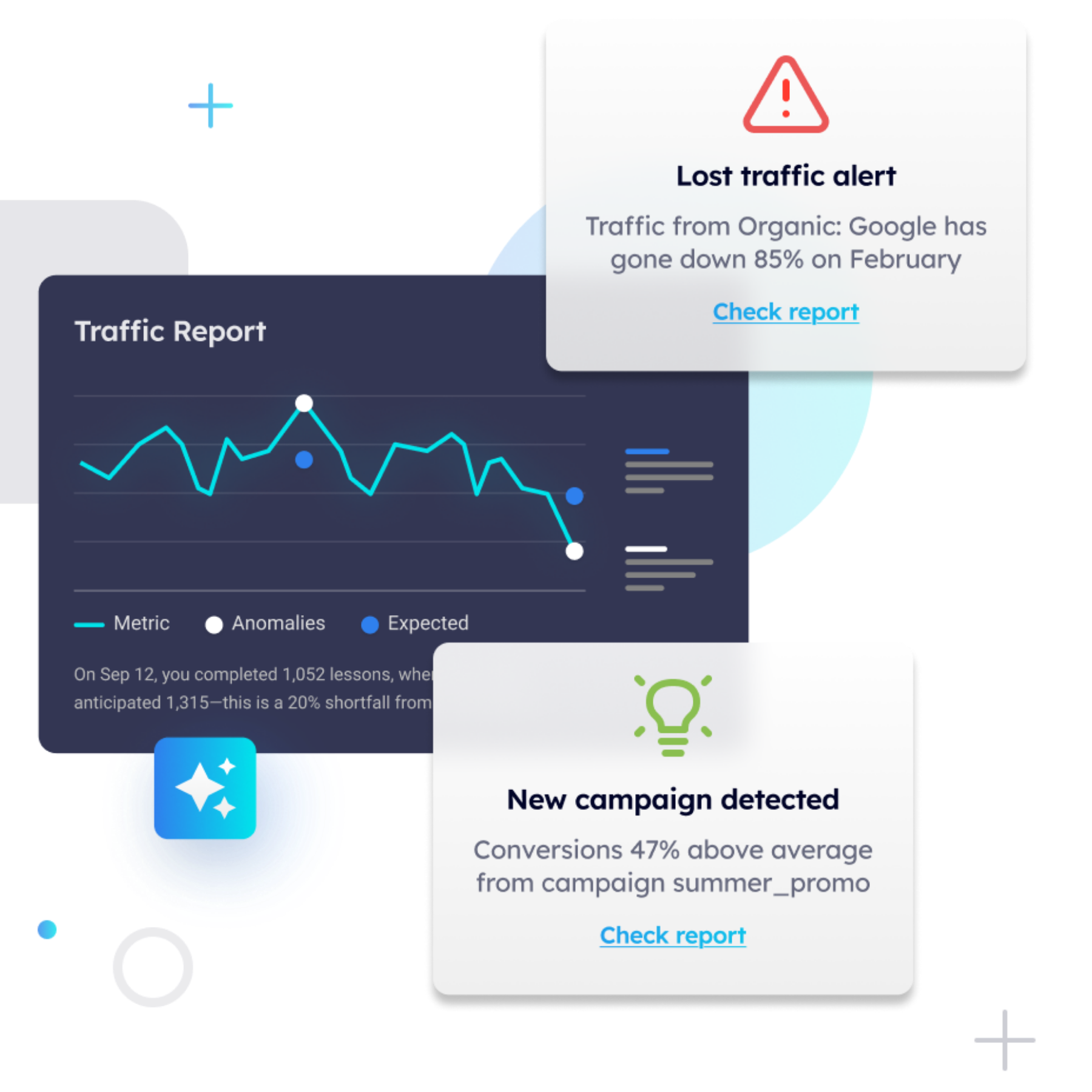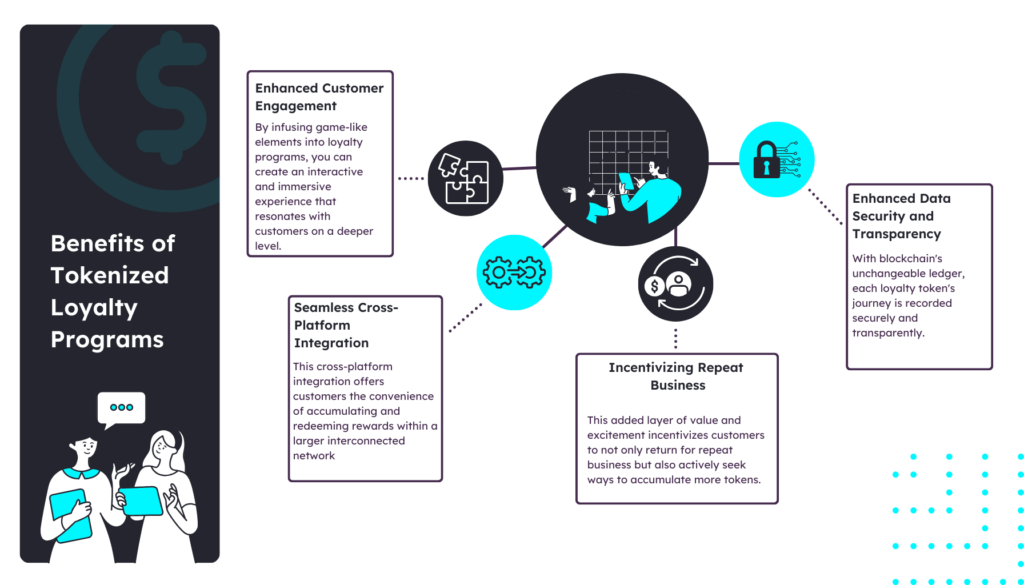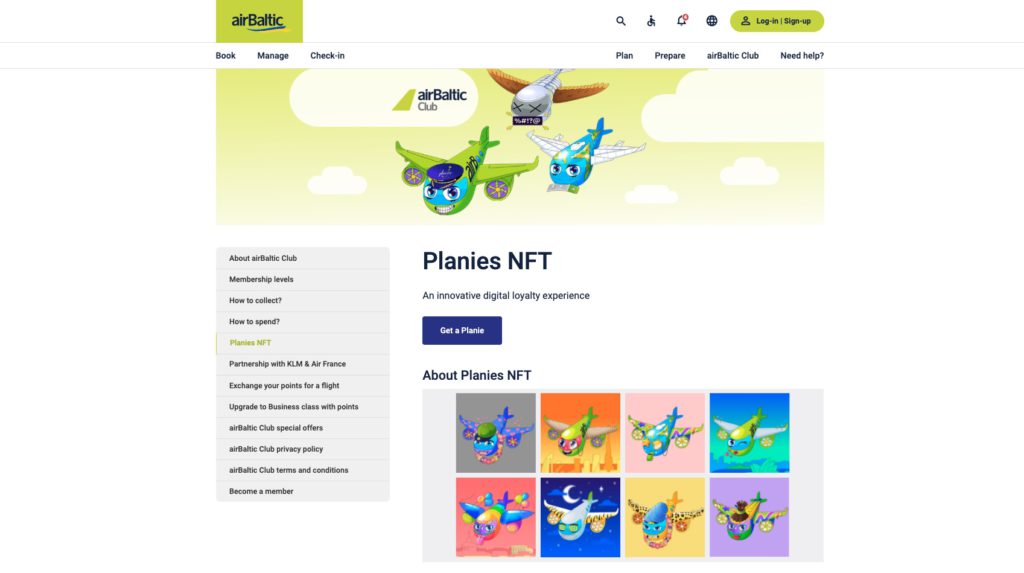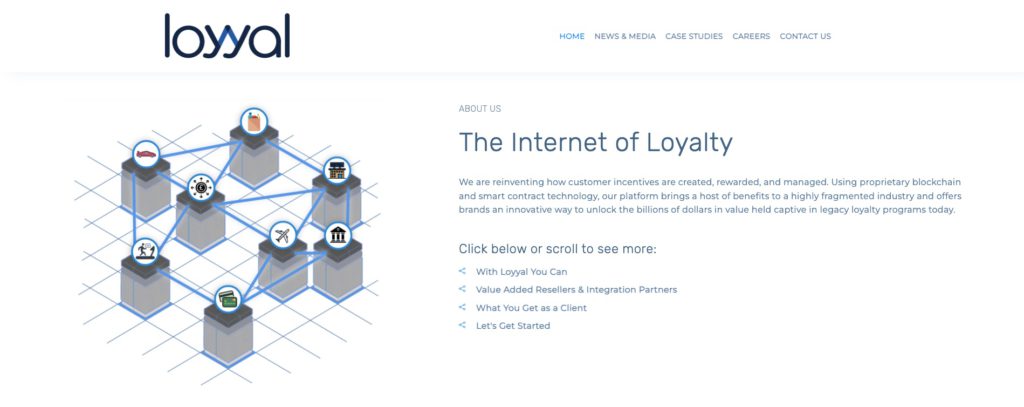A transformation is underway in the landscape of customer loyalty; driven by the fusion of traditional engagement strategies with the power of blockchain technology. As businesses strive to deepen customer connections and foster repeat business, the emergence of tokenized loyalty programs has garnered attention for its potential to revolutionize customer engagement and retention.
Traditional loyalty programs, while effective in their own right, often fall short of meeting the evolving demands of modern consumers. Challenges such as fragmentation, lack of transparency, and diminishing perceived value have led to a growing need for innovation in loyalty strategies. Blockchain technology offers a new paradigm that reimagines loyalty as a tradable and interactive experience.
We’ll dive into the concept of tokenized loyalty programs—a concept that has gained momentum by leveraging the transformative properties of blockchain. We’ll explore how this innovation transcends the limitations of conventional loyalty programs, discussing the benefits of using blockchain to create secure, tradable loyalty tokens that incentivize repeat business.
By diving into the evolution of loyalty programs, the advantages of tokenized engagement, and real-world case studies, we uncover how you can harness this technology to build deeper customer relationships and unlock unparalleled retention strategies.
Table of Contents
The evolution of loyalty programs
As pillars of customer retention, traditional loyalty programs have been an integral part of our strategies for decades. However, in the face of shifting consumer expectations and the digital revolution, these programs have faced challenges that demand a reimagining of their structure and effectiveness.
One of the glaring limitations of traditional loyalty programs lies in their lack of transparency. Customers often find themselves struggling to comprehend the inner workings of these programs—how points are earned, redeemed, and their actual value. This opacity erodes trust and can leave customers feeling uncertain about the rewards they’re working towards.
Traditional loyalty programs often fall into a cycle of offering generic rewards that may not resonate with individual customer preferences. The result is a perceived lack of value. When customers feel that the rewards are not aligned with their needs and desires, their motivation to engage diminishes.
The culmination of these challenges has a direct impact on customer engagement. When loyalty programs lack transparency, are cumbersome to manage, and offer rewards that don’t feel personally valuable, customers become less likely to actively participate. This can lead to a decline in the overall effectiveness of the loyalty program as customers disengage or, worse, abandon the program entirely.
The emergence of tokenized loyalty programs
Tokenized loyalty programs leverage blockchain technology to revolutionize customer rewards systems. Instead of traditional loyalty points or rewards cards, these programs leverage digital tokens that are securely recorded on a blockchain.
Each transaction or interaction with a brand earns customers a specific number of tokens, which can be redeemed for various benefits such as discounts, exclusive access, or even cryptocurrency. This innovative approach not only simplifies the reward process but also opens up new opportunities for cross-brand collaborations and customer engagement in the digital age.
Blockchain addresses the challenges of traditional programs by offering a transparent and secure ledger that records all transactions and data changes. This transparency ensures that any discrepancies or fraudulent activities can be easily identified and traced back to their source, promoting trust in the system.
The decentralized nature of blockchain enhances security, as there is no single point of failure vulnerable to cyberattacks. Each participant in the network has a copy of the entire blockchain, making it extremely resilient. Additionally, blockchain’s architecture allows for seamless integration with other systems and technologies, enabling the development of complex applications and facilitating interoperability between different industries and sectors.
Get your website’s conversion score in minutes
- Instant CRO performance score
- Friction and intent issues detected automatically
- Free report with clear next steps

The emergence of tokenized loyalty programs
Tokenized loyalty programs leverage blockchain technology to revolutionize customer rewards systems. Instead of traditional loyalty points or rewards cards, these programs leverage digital tokens that are securely recorded on a blockchain.
Each transaction or interaction with a brand earns customers a specific number of tokens, which can be redeemed for various benefits such as discounts, exclusive access, or even cryptocurrency. This innovative approach not only simplifies the reward process but also opens up new opportunities for cross-brand collaborations and customer engagement in the digital age.
Blockchain addresses the challenges of traditional programs by offering a transparent and secure ledger that records all transactions and data changes. This transparency ensures that any discrepancies or fraudulent activities can be easily identified and traced back to their source, promoting trust in the system.
The decentralized nature of blockchain enhances security, as there is no single point of failure vulnerable to cyberattacks. Each participant in the network has a copy of the entire blockchain, making it extremely resilient. Additionally, blockchain’s architecture allows for seamless integration with other systems and technologies, enabling the development of complex applications and facilitating interoperability between different industries and sectors.

Benefits of Tokenized Loyalty Programs
Enhanced Customer Engagement through Gamification
In the realm of customer engagement, gamification has emerged as a potent tool, and tokenized loyalty programs take this concept to new heights. By infusing game-like elements into loyalty programs, you can create an interactive and immersive experience that resonates with customers on a deeper level. Gamified loyalty programs tap into customers’ intrinsic desire for competition, achievement, and recognition, driving them to actively participate and strive for rewards.
Imagine a tokenized loyalty program where customers earn loyalty tokens not just by making purchases, but by completing challenges, referring friends, or engaging with brand content. These earned tokens become more than just points; they become tokens of accomplishment. Customers are motivated to accumulate tokens, unlocking tiers and rewards that feel like achievements. The ability to trade these tokens adds a dynamic layer of excitement, as customers can choose to hold onto tokens or exchange them for rewards that truly resonate.
Seamless Cross-Platform Integration
One of the standout advantages of tokenized loyalty programs lies in their ability to seamlessly integrate across platforms and brands. Traditional loyalty programs often lock customers into a single brand’s ecosystem, limiting the flexibility and scope of rewards. In contrast, blockchain-based loyalty programs transcend these boundaries.
Imagine a customer who earns loyalty tokens at their favorite coffee shop. These tokens can then be seamlessly used to redeem rewards at a partner restaurant or even an online retailer within the same loyalty ecosystem. This cross-platform integration offers customers the convenience of accumulating and redeeming rewards within a larger interconnected network, enhancing the overall value proposition of the loyalty program.
Incentivizing Repeat Business with Tradable Tokens
One of the most intriguing aspects of tokenized loyalty programs is the concept of tradable loyalty tokens. Blockchain’s inherent feature of creating unique, secure, and tradable digital assets opens doors to an entirely new level of engagement. Customers no longer view their loyalty rewards as static points—they become dynamic tokens of value that can appreciate and be exchanged.
Picture a customer who collects loyalty tokens for consistently choosing a particular airline. These tokens, instead of being locked within a single ecosystem, can be exchanged for tangible rewards or even traded on secondary markets. This added layer of value and excitement incentivizes customers to not only return for repeat business but also actively seek ways to accumulate more tokens.
Enhanced Data Security and Transparency
Central to the appeal of blockchain technology is its ability to provide enhanced security and transparency. In the context of loyalty programs, this translates to customer data security and transaction accuracy. Traditional loyalty programs may raise concerns about data breaches or discrepancies in point accrual and redemption.
With blockchain’s unchangeable ledger, each loyalty token’s journey is recorded securely and transparently. Customers can trust that their earned tokens, transactions, and rewards are accurately tracked and accounted for. This enhanced data security fosters customer confidence in the program’s integrity, addressing concerns that often plague traditional loyalty initiatives.
Real-World Examples of Tokenized Loyalty Programs
Airline Loyalty Programs: A Digital Transformation
Blockchain technology has propelled airline loyalty programs into a new era of digital engagement. Tradable loyalty tokens empower frequent flyers to not only earn miles but also access benefits like flight upgrades, priority boarding, and exclusive lounge access by trading tokens within the program’s ecosystem. This digital transformation enhances customer satisfaction and loyalty by providing tangible value in exchange for their engagement.
Retailer Loyalty Programs: Fostering Brand Loyalty
Retailers are embracing tokenized loyalty programs as a means to foster brand loyalty in a competitive landscape. Customers can earn loyalty tokens by making purchases and engaging with the brand, and these tokens hold real value as they can be traded for exclusive discounts or early access to products. This approach bridges the gap between loyalty and customer retention, offering customers a unique, personalized experience while increasing brand affinity.

Overcoming Adoption Barriers of Tokenized Loyalty Programs
The journey towards implementing tokenized loyalty programs is not without its share of challenges. When transitioning from traditional loyalty models to blockchain-powered ecosystems, addressing potential adoption barriers becomes imperative for the success of these innovative strategies.
Navigating Technological Complexity:
One of the primary challenges in the adoption of tokenized loyalty programs is the perceived complexity of blockchain technology. Those unfamiliar with blockchain concepts might find the learning curve daunting. To overcome this barrier, education is key. Simplifying the technical aspects and providing accessible resources can empower an understanding and acceptance of the benefits of blockchain for loyalty initiatives.
Customer Familiarity and Trust:
For customers, the notion of tradable digital tokens might be unfamiliar territory. The idea of owning digital assets that can appreciate and be exchanged might require an adjustment in perspective. Establishing trust through transparent communication about the security, value, and benefits of tokenized loyalty programs is crucial. You can use educational content, FAQs, and customer support to alleviate concerns and build customer confidence.
Integration Challenges:
Integrating blockchain technology with existing loyalty infrastructure can be intricate. You may be hesitant due to concerns about disrupting current systems and processes. To mitigate this, you can explore phased implementations or collaborate with technology partners specializing in blockchain integration. Demonstrating the potential for streamlined operations and enhanced customer experiences you can embrace the change.
Educational Campaigns for Customer Engagement:
Educating customers about the value and potential of tokenized loyalty programs is paramount. Leverage multiple channels such as social media, webinars, and explainer videos to convey the benefits of the new loyalty model. Demonstrating how tokenized rewards offer more value, interactivity, and convenience can encourage customers to actively participate and engage.
Pilot Programs and Incentives:
To ease the transition for both yourself and your customers, implementing pilot programs can be effective. This allows you to test the waters, gather feedback, and refine your offerings. Additionally, introducing initial incentives, such as exclusive rewards or bonus tokens for early adopters, can create a sense of excitement and encourage participation.
Collaboration and Partnerships:
Collaborating with blockchain experts, technology providers, or industry peers can help bridge the knowledge gap and expedite the adoption process. Partnerships can provide insights, resources, and guidance, making the journey towards tokenized loyalty programs more manageable and informed.

The Future Landscape of Loyalty Programs
One of the exciting trends on the horizon is the potential for interoperability between different loyalty ecosystems. As you consider adopting tokenized loyalty programs, customers can seamlessly use their loyalty tokens across various brands and industries. Imagine a scenario where a customer’s loyalty tokens earned from a coffee shop can be used for discounts at a clothing store or even to access premium content on a media platform. This level of cross-ecosystem integration enhances the value of loyalty tokens, making them even more versatile and appealing to consumers.
Interoperability and Expanded Ecosystems:
One of the exciting trends on the horizon is the potential for interoperability between different loyalty ecosystems. As you consider adopting tokenized loyalty programs, customers can seamlessly use their loyalty tokens across various brands and industries. Imagine a scenario where a customer’s loyalty tokens earned from a coffee shop can be used for discounts at a clothing store or even to access premium content on a media platform. This level of cross-ecosystem integration enhances the value of loyalty tokens, making them even more versatile and appealing to consumers.
Integration of AI and IoT:
Emerging technologies like Artificial Intelligence (AI) and the Internet of Things (IoT) hold transformative potential for loyalty programs. AI-driven personalization enables you to tailor loyalty rewards and recommendations based on individual customer preferences, behavior, and purchase history. This level of customization elevates the customer experience, making loyalty rewards more relevant and valuable.
Increase +180% conversions from your website with AI
Get more conversions from your existing traffic by delivering personalized experiences in real time.
- Adapt your website to each visitor’s intent automatically
- Increase conversions without redesigns or dev work
- Turn anonymous traffic into revenue at scale

IoT integration can create a dynamic loyalty environment by allowing customers to earn tokens through interactions with smart devices. For instance, a fitness tracker could reward users with loyalty tokens for achieving health milestones, or a smart home system could offer tokens for energy-efficient habits. This fusion of loyalty with technology enriches customer engagement and enables a connection with customers in novel and impactful ways.
Innovative Reward Mechanisms:
The traditional concept of loyalty points is evolving into more engaging and innovative reward mechanisms. Tokenized loyalty programs can introduce new dimensions to rewards, such as limited edition digital collectibles, access to exclusive events, or even fractional ownership of brand assets. This imaginative approach ensures that customers are not just collecting points but participating in unique experiences and becoming stakeholders in your brand’s journey.
Decentralization and Consumer Ownership:
As blockchain technology empowers individual ownership of tokens, the future of loyalty programs could see a shift towards decentralization. Customers may have greater control over their loyalty tokens, choosing when and how to redeem them. This decentralized ownership enhances customer empowerment, reinforcing the sense of value associated with loyalty rewards.
Environmental and Social Responsibility:
In an era where sustainability and ethical practices are gaining prominence, tokenized loyalty programs could align with environmental and social causes. Offer customers the option to contribute their loyalty tokens to charitable initiatives or environmental projects, adding a philanthropic layer to the loyalty experience.
Conclusion
As we’ve explored the benefits, potential challenges, and future landscape of tokenized loyalty programs, a clear narrative emerges: the future of loyalty is both dynamic and transformative. The limitations that once constrained traditional loyalty models are being dismantled, and replaced by the promise of enhanced customer engagement, trust, and value. Gamification breathes life into loyalty, cross-platform integration paves the way for seamless experiences, and the concept of tradable tokens ignites excitement and loyalty.
But beyond these innovations lies a philosophical shift—a shift towards recognizing customers not as passive recipients of rewards, but as active participants in their loyalty journey. This journey is one where customers have agency, where their data is secure, and where the rewards they earn hold tangible value.
The future also holds the promise of loyalty that transcends boundaries. The interoperability between ecosystems, the fusion with AI and IoT, and the potential for customer-owned tokens represent an evolution that extends beyond transactions to building lasting relationships. This evolution, in turn, fuels a sense of loyalty that extends beyond discounts—a loyalty that is as much about experiences, shared values, and collective impact.
When venturing into this tokenized future, the challenge lies not just in adopting technology but in embracing a new mindset. A mindset that values transparency, that seeks to engage rather than entice, and that recognizes that loyalty is not just a program—it’s a commitment to forging connections.

